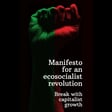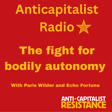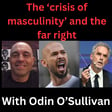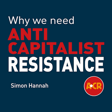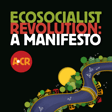Become a Creator today!Start creating today - Share your story with the world!
Start for free
00:00:00
00:00:01

Introduction to Marxism Part Three: Economics
After starting with philosophy and sociology, Ian Parker finishes his introductory course by explaining how Marx criticised captialism as a system of exploitation and oppression against the majority in the interests of the captialist minoprity and how we can overthrow ther system in the interests of humanity and sustainable life on Earth
Transcript
Introduction to Marxism: Labour and Capitalism
00:00:00
Speaker
This is the third part of an introduction to Marxism. The first and second parts focus on philosophy and sociology and this third part focuses on economics, specifically on labour, exploitation and communism.
00:00:24
Speaker
And then we'll finish with some general conclusions.
00:00:29
Speaker
English political economy gives according to Lenin, gives Marx a crucial third tradition of work alongside German idealist philosophy and the French sociological socialism for him to develop a revolutionary analysis of capitalism.
00:00:54
Speaker
So this third enlightenment tradition is not merely added to the two other traditions It provides the material basis for working through the problems Marx had already analysed.
Critique of Political Economists
00:01:12
Speaker
And it shows the political logic through which we might build communism. There are three political economists who appear again and again in Marx's 1867 book, Capitale.
00:01:28
Speaker
And Marx takes them seriously because they provide the foundations for his own analysis And these are Adam Smith, an economist who was actually Scottish, David Ricardo, a businessman and member of the English Parliament, and Jeremy Bentham, a utilitarian philosopher and social reformer.
00:01:52
Speaker
There are other writers, but these three are worth mentioning because they already disclose something about the nature of capitalism that Marx can build upon.
00:02:04
Speaker
They're very different, these three, from the so-called vulgar economists who simply took the surface appearance of capitalism as given and spent their time justifying it. And we need to remember that the subtitle of Marx's book, Capital, is a critique of political economy.
00:02:27
Speaker
It's a critique of these political economists.
00:02:32
Speaker
Adam Smith had argued that the beneficent hidden hand of the market in civil society would regulate individual competition and if the state didn't interfere then it would lead to social harmony.
Market Exchange and Capitalism's Assumptions
00:02:50
Speaker
David Ricardo argued that prices of goods are regulated by embodied labour time that could be agreed on by a fair contract.
00:03:00
Speaker
between the worker and employer. And Jeremy Bentham argued for the greatest good for the greatest number of people, balancing out their individual needs and offers of work.
00:03:13
Speaker
And Marx pours scorn on that kind of image of market exchange as resting on assumptions about every individual as being like a little English shopkeeper, valuing Marx says in a phrase from Capital, freedom, equality, property, bentham.
00:03:36
Speaker
Now there are limitations to the analyses that these three writers provide of course which boil down to their shared assumption that society developed through different stages through which it supported itself.
00:03:53
Speaker
Four main modes of subsistence being for them, for these four, for these three, being hunting, pastoralism, agriculture and commerce where we are today.
00:04:07
Speaker
So they take it for granted that this last stage, commerce, flowers under capitalism and as if we're all free and equal property owners.
00:04:17
Speaker
And so you can see versions of their arguments in to- today's tabloid press, vulgar economics.
Alienation and Labour under Capitalism
00:04:26
Speaker
Marx works on their insights about the market, work and individual competitiveness under capitalism to reveal a deeper logic concerning the role of labour, exploitation and the movement towards communism.
00:04:45
Speaker
So if there really is to be the kind of common good that these enlightenment economists aim for, it'll require building an analysis from the standpoint of labor and exposing exploitation.
00:05:02
Speaker
So a focus on labor, on exploitation and communism are the three aspects of Marxist critique outlined in Capital that we're gonna look at now.
00:05:15
Speaker
starting with labour.
00:05:21
Speaker
ah We know that our creative labour under capitalism is turned against us. That what we produce confronts us as being a series of alienating hostile entities, commodities.
00:05:38
Speaker
and that in the process we ourselves are also turned into commodities that are bought and sold on the labour market. And this process is destructive, self-destructive, because it's our labour that defines us as human beings.
00:05:54
Speaker
So we should think of this creative labour in the broadest sense to include the production of useful and beautiful objects, relationships, tools through which we can metabolise nature.
00:06:11
Speaker
Our relation to nature and our relation to other human beings are both blocked by capital. Capital presents itself to us, even to capitalists themselves, as ah as if it is a thing rather than a relation.
00:06:29
Speaker
It's only concerned with the production of values that are for exchange rather than for our own use. And everything is submitted to the drive for profit.
00:06:41
Speaker
So let's look at Marx's critical analysis of capital, value and profit as building blocks of capitalist economy. These are the three essential elements of labour under capitalism.
00:06:59
Speaker
cap
00:07:02
Speaker
Capitalism systematically separates production and our creative labour from consumption. And it turns consumption into a separate realm of life in which we're made to imagine that it's there that we have the agency that's been denied to us in the realm of work Marx's analysis is, of course, of a particular mode of production, a system of economic relations that operate in such a way that instead of us experiencing it as a relation between people, something we're intimately part of and able to change, we experience it as a relation between things.
00:07:49
Speaker
And at the heart of this is a deepening of alienation through which one particular kind of commodity becomes predominant, becomes universal.
00:08:01
Speaker
And that commodity is money. Money. Money is a historically specific universal equivalent, Marx says.
00:08:13
Speaker
A general economy, commodity. that stands in for, replaces real human universals like creative labour and connection with other people.
00:08:25
Speaker
Back in his 1844 economic and philosophical manuscripts Marx comments on the role of money as now being, I quote, the bond binding me to human life, binding society to me, connecting me with nature and other people.
00:08:49
Speaker
While money operates as the bond of all bonds, he says, it actually separates us from each other. It's also, Marx says, the universal agent of separation.
00:09:05
Speaker
Then, much later, in 1867, Marx grounds this philosophical analysis in capitalist economics, in which there is a transformation of the role of money.
00:09:22
Speaker
Instead of commodities being sold for money, Money is a medium of exchange so that other useful commodities can be bought.
00:09:33
Speaker
Money is put to work by the capitalists to buy commodities and to sell them in order to make more money. So it's necessary to accumulate money or to access money through financial institutions in order to provide the means of production of factories and the machinery and the other technological instruments and so on.
00:09:58
Speaker
And in order to hire workers, it's absolutely essential then that the capitalist is able to access the money which becomes the capital needed to pay for these different aspects of production.
00:10:14
Speaker
As a historical phenomenon, as a distinctive set of social relations, capitalism has to be able to engage in sufficient primitive accumulation of capital to get going.
00:10:26
Speaker
And that primitive accumulation of capital, remember it's a social relation, combines technological development and an apparatus of coercion to make it that people can only survive by selling their labour power in order to live.
00:10:44
Speaker
So you see here again why Marx defines capital itself as a social relation.
The Role of Capital and Surplus Value
00:10:54
Speaker
That social relation has been commodified, reified, turned into a series of things, but it's possible to conceptualise how it functions in capitalist production.
00:11:07
Speaker
For the capitalist, the production process consists of two parts. There is constant capital which consists of the means of production, the material and the technology that becomes part of the eventual product.
00:11:25
Speaker
It's constant because no extra value magically appears from it. That much was something noticed by the political economists that Marx was critiquing.
00:11:36
Speaker
Constant capital is important, it's necessary, but it is human labour that produces value. So the other part of capital in production is essential and that is variable capital.
00:11:51
Speaker
And that basically is the industrial processing of human labour. It is variable because it varies. It increases during the production process.
00:12:05
Speaker
And here Marx is making a distinction that the political economists hadn't noticed or refused to notice. Here is the labour theory of value.
00:12:16
Speaker
Labour is the key to capital as an exploitative social relation. And to value.
00:12:26
Speaker
So let's look at value in a little more detail.
00:12:31
Speaker
A key distinction, which is essential to Marx's analysis, is between labour power and labour put to work.
00:12:43
Speaker
Our labour power is our capacity to labour that we sell to the capitalist. It's sold to them, our labour power, as if it's a commodity, as if it's a thing.
00:12:56
Speaker
And then instead of us creatively labouring to produce something for ourselves, that labour power is put to work ah value is produced, some extra value which the capitalist extracts.
00:13:12
Speaker
So the difference between the labour power and the labour power labor put to work in the production process under capitalism is surplus value.
00:13:26
Speaker
In the capitalist production process Labour power itself is commodified, turned into a thing. And so the source of what Marx calls surplus value is the source of profit.
00:13:44
Speaker
Labour power is a unique kind of commodity. It's able to create value. So capitalists are driven by the need to make profit and in order to do that they must extract surplus value from us workers.
00:14:02
Speaker
So it's important to notice here that this surplus value is still only a potential source of profit and that profit will only be realised if the objects we produce are actually sold on the marketplace.
00:14:21
Speaker
So the capitalists, the poor capitalists, are themselves caught in quite a precarious situation for if they've hired workers to produce lots of objects that can't be sold, then there's no profit for them.
00:14:35
Speaker
That's the situation they'll always face and especially at times of crisis when there's overproduction of goods or the other side of the coin, under consumption, people aren't consuming enough.
00:14:49
Speaker
The basic underlying rule under capitalism is that profits are privatised. Capitalists turn the surplus value into profit during business as usual and in the boom times, and losses are collectivised.
00:15:08
Speaker
That is, the working class pays en masse during times of crisis. At times of crisis, capitalism will take measures to ensure that the basic underlying rule is followed and is Despite the vain hopes of the political economists who wanted the state to keep out of the supposedly automatic benevolent self-regulation of the economy, this rule is always enforced by the state.
00:15:40
Speaker
That was the case in the 18th century classical liberal capitalism and it is the case now under neoliberal capitalism.
00:15:50
Speaker
There's an important aspect of Marx's analysis of capitalism that's worth noticing here. He drew general lessons about the nature of capitalist production from the specific economic data that he gathered together in the British Library in London and in Cheetham's library in Manchester.
00:16:13
Speaker
And he then presented this analysis in Capital. it sometimes then appears to be rather abstract as when he's speaking there about socially necessary labour time.
00:16:26
Speaker
But socially necessary labour time is what each capitalist will have to manage when they calculate what the average worker with average skill will be able to produce.
00:16:39
Speaker
Marx presents it in this way to show how profit arises from human labour and he needs abstract notions in order to analyse how things work out concretely in relation to all of the other aspects of capitalist production that counterbalance and contradict each other.
00:17:01
Speaker
So here we come to the key question of profit. Marx uses abstract conceptual categories to identify general processes.
00:17:14
Speaker
So we then require more detailed concrete and concrete analysis of specific instances to show how that process is enforced by a capitalist competing with other capitalists needing to sell the goods that have been produced so they can realise their surplus value profit.
00:17:33
Speaker
profit Class struggle always enters into this process and complicates it, causing difficulties for the capitalists and for the political economists.
00:17:46
Speaker
Workers submit to labour discipline in order to perform better than average or they resist, upsetting the calculations each capitalist has made about outplay and possible profit.
00:18:01
Speaker
So remember, this analysis is of the economy as a set of social relations and all of the stuff of philosophy and sociology and much more is already embedded in the analysis and what is analysed.
00:18:19
Speaker
This is not political economy as a predictive science, but it's a critique of political economy. And it's an intervention designed to make capitalism even more unstable, unpredictable.
00:18:36
Speaker
Class struggle is also a factor in altering each particular aspect of class relations, something that Marx himself makes clear in Capital.
00:18:46
Speaker
For instance, there's a well-known economic prediction that Marx makes which is that if nothing else changes there's a tendency in Capitalism for the rate of profits to fall.
Technological Impact on Capitalism's Structure
00:18:59
Speaker
There is that tendency precisely because the surplus value that appears in the production process is drawn from human labor and not, as if by magic, from the machinery.
00:19:15
Speaker
with technological innovation, which becomes a a potentially progressive force when it's combined with human labour, the proportion of constant capital in relation to variable capital increases.
00:19:32
Speaker
Then there's a smaller proportion from which the capitalist can extract surplus value. Less surplus value means less profit. So these forces of production do not simply push up against the existing relations of production.
00:19:52
Speaker
For these apparently objective forces are themselves social relations that enable capitalism to function and which hinder a move beyond capital and class relations.
00:20:09
Speaker
So this is ah this is a tendency, a rate of profit to fall, that is countermanded by many other factors. Wages can always be lowered, work discipline can always be ramped up.
00:20:21
Speaker
And so whether or not technological advances will play out in favour of the workforce or in favour of the capitalists who employ them in order to make profit, that will depend on the overall balance of forces.
00:20:37
Speaker
The technology is already itself a set of social relations that have been turned into things. So this balance of forces brings into the political realm an explicit concern with capital as a social relation, with a production of value and a direct challenge to profit.
00:21:02
Speaker
This brings us to the role of exploitation at the heart of capitalism. Capitalism is extrinsically, intrinsically exploitative.
00:21:14
Speaker
What exactly is exploitation as opposed to oppression?
00:21:24
Speaker
Capitalism is a kind of machine that drives each capitalist to make profit and compels them, the capitalists, to whip their workers into submitting to it.
00:21:38
Speaker
They use the state and other para-state forces to break resistance to their rule. But the extraction of surplus value is not something under the deliberate conscious control of each separate capitalist.
00:21:54
Speaker
There is a continual systemic war by capitalists to maintain the kind of social relations that will enable them to extract surplus value and realise it as profit.
00:22:09
Speaker
And that ongoing war involves battles on a number of different fronts. These battles are against the unity of the working class, with many attempts to sow divisions, and the battles also occur against different oppressed groups that are embedded in capitalism, and whose liberation depends on the overthrow of capitalism.
00:22:33
Speaker
We can already see in Marx's analysis aspects of what we would now call intersectional struggles in which exploitation in the workplace is linked with other forms of oppression.
00:22:48
Speaker
The basic bare elements of economic analysis that Marx carries out have far reaching consequences for struggles of women, migrant workers for example,
00:22:59
Speaker
So let's examine in a bit more detail the broader dimensions of exploitation that are operating under capitalism in relation to the reproduction of the workforce and the division of labour.
00:23:15
Speaker
First, reproduction. Trades unions, other organised groups of workers under capitalism are usually focused on resisting attempts by capitalists to increase the rate of surplus value.
00:23:29
Speaker
And we know that these struggles must extend beyond the industrial workplace if they're eventually to be successful. Capitalists must in ensure the reproduction of the workforce and feminist analyses of social reproduction has drawn attention to the impact on women at home ah sweat as well as at work.
00:23:54
Speaker
One instance of this process is anticipated in Marx's writing and found in the distinction between absolute surplus value and relative surplus value.
00:24:11
Speaker
The struggle that Marx describes in Capital over the 1847 10 hours factory bill in the British Parliament, it was a bill that restricted the working hours of women and young children.
00:24:26
Speaker
That was a victory by the working class as a whole to put a limit on the extraction of absolute surplus value, the total amount.
00:24:39
Speaker
If work is too intense or the hours are too long or the wages are insufficient to maintain the workforce, then the extraction of absolute surplus value does effectively reach a limit.
00:24:53
Speaker
There's a breaking point, but the capitalists will push as far as they can to maximize that, usually regardless of the health of their employees. The basic struggle for workers' health against the extraction of absolute surplus value goes alongside another more complicated struggle, which is resistance against the capitalists' attempt to extract what Marx called relative surplus value.
00:25:23
Speaker
And this method of exploitation includes technological innovations that entail competition between different capitalist enterprises so that the labour power employed will be more efficient, greater efficiency.
00:25:39
Speaker
It includes lowering wages when machines replace human beings or when the number of unemployed workers, the so-called reserve army of labour, increases.
00:25:51
Speaker
Cheaper labour power from migrant workers or the relocation of industry to other parts of the world also enables the extraction of relative surplus value relative to the existing one.
00:26:08
Speaker
Many social processes taking place as part of a broader class struggle consist of a combination of absolute and relative surplus value. An example here is the role of women coming into the workforce.
00:26:22
Speaker
Their lower wages are a source of relative surplus value because they work for cheaper. They work cheaper. And at the same time, the usually hidden work of women in the home ensures the reproduction of the workforce all the time. And that enables the extraction of absolute surplus value if we look across the economy as a whole.
00:26:44
Speaker
So as with Marx's first brief analysis of colonialism, we have the basis here. of an understanding of the logic of capitalism.
00:26:56
Speaker
This logic is to increase exploitation and as a consequence to attempt to pit the oppressed against each other as they fight for the right to work.
00:27:09
Speaker
Capitalism pits us against each other. It creates divisions and it relies on the division of labour. So let's say something about this division.
00:27:21
Speaker
Certain kinds of work are assigned to different categories of people and specialisation is now often sold to people in terms of career choices or discovery of different abilities or job preference.
00:27:38
Speaker
That is a division of labour under capitalism is necessary for its increased productivity. But the separation of categories of people from each other in the process is both individualized, as if they choose to sell their labor power to a certain kind of employer of their own free will, and it's collectivized, but in a dehumanizing, distorted way that results in segregation and at its worst in the intensification of racism and sexism.
00:28:17
Speaker
Here, the division of labour, which is built on the separation of different kinds of labour from each other, is a necessary part of the worldview of the bourgeoisie.
00:28:30
Speaker
They search for sources of surplus value in specialised forms of production, in niche markets where they can realise that surplus value as profit.
00:28:42
Speaker
And this kind of specialisation of economic functions under capitalism is then played out in ideological specifications. Which kind of person is best suited to which kind of work and which kind of consumer will prefer which kind of product?
00:29:00
Speaker
This, for Marx, has a historical basis, of course.
00:29:06
Speaker
As he puts it back in 1845 in his book, The German Ideology, the division of labour leads, I quote, to the separation of industrial and commercial from agricultural labour to, quote again, the separation of town and country.
00:29:25
Speaker
and to the separation of commercial from industrial labour. So as a consequence, Marx points out, when such a distribution of labour is imposed, each worker has a particular exclusive sphere of activity that is forced upon them that they can't escape from.
00:29:48
Speaker
That kind of division of labour is presented to us in bourgeois ideology as natural, inevitable.
Exploitation and Class Struggle
00:29:56
Speaker
Other kinds of division in society are viewed as unfortunate by enthusiasts for capitalism, mere side effects that are unnecessary, just as a supposedly free contract to sell one's labour power is only viewed as a problem when it's viewed as unfair.
00:30:15
Speaker
The underlying historical basis for exploitation is sold to us as fair, as if it were fair. But against the English political economists, Marx shows that the sale of labour power in each particular case is not only a problem when it's seen as unfair, the unfairness is built into the system of production as an intrinsic part of it.
00:30:44
Speaker
There's no possible fair contract in the sale of labor power because the extraction of absolute and relative surplus value and then its realization as profit relies upon exploitation.
00:31:03
Speaker
There is an alternative. So let's turn from exploitation to communism.
00:31:14
Speaker
Marx imagines an alternative to the current division of labour that will not pin us down into categories of people or fixed identities.
00:31:27
Speaker
A communist society, he suggests, in the 1845 German ideology, a communist society, would be one that makes it possible for me to do one thing today and another tomorrow.
00:31:41
Speaker
And here's a famous quote. To hunt in the morning, fish in the afternoon, rear cattle in the evening, criticise after dinner, just as I have in mind, without ever becoming hunter, fisherman, herdsman or critic.
00:31:56
Speaker
Okay. A little anachronistic, a little archaic, that formulation, but you get the point. But his more fluid, open view of communism rests on access to the commons as shared natural and human resources and an expanded, developed image of what might be useful for us
00:32:24
Speaker
Let's look at the Commons for a moment. The logic of capitalist development is built on the destruction of the Commons to enable exploitation. It's built basically on privatisation.
00:32:39
Speaker
We see this logic in the earliest stages of capitalist development and the brutal uprooting of people from their common land. That's described in Marx's Capital.
00:32:50
Speaker
The enclosure of the Commons was quickly followed by legal measures to they ensure that people were forced to obtain gainful employment, that is to sell their labour power in order to live.
00:33:02
Speaker
And in contrast, The logic of working class struggle is to collectivise, to regain access to the commons.
00:33:13
Speaker
This doesn't however mean that Marx romanticised the land as a place to which people should return under capitalism. Neither did he romanticise a return to basic unmediated needs or products of useful labour.
00:33:30
Speaker
So when a distinction is made by Marxists between productive and unproductive labour for instance, It's to identify the kinds of labour that are useful, productive for capitalism, not for us.
00:33:47
Speaker
Our productive capacity is rooted in our distinctive capacity to labour. In capital, Marx puts it like this.
00:34:00
Speaker
we presuppose labour in a form that stamps it as exclusively human. That's something that runs through his philosophy, sociology and economics.
00:34:13
Speaker
He then makes an important contrast, writing that, and here's a famous quote, a spider conducts operations that resemble those of a weaver, and a bee puts to shame many an architect in the construction of her cells.
00:34:31
Speaker
Well, that part of the contrast as admires nature, but then Marx brings in the other side of the contrast to emphasise how human labour is distinctively entwined with nature,
00:34:43
Speaker
as as he puts it, to metabolise it, to metabolise nature. So he continues, in a continuation of the famous quote, to write, what distinguishes the worst architect from the best of bees is this, that the architect raises their structure in imagination before they erect it in reality.
00:35:11
Speaker
Imagination, Marx will also point out, is not the property of an atomized, isolated individual, but it's collective.
00:35:22
Speaker
And what counts as imaginative or useful will depend on our relations with other people. So how can we understand what is productive or useful in a way that is critical of capitalism?
00:35:36
Speaker
Here we come to the question of use.
From Alienation to Communism's Promise
00:35:38
Speaker
Here we come to an underlying distinction that Marx makes in his analysis of capitalism. Marx distinguishes between use value and exchange value.
00:35:53
Speaker
Now we could have looked at that distinction earlier under philosophy, but it also has consequences for the way we understand the drive towards communism.
00:36:04
Speaker
What we produce, Marx says, appears to have ah direct, immediate and obvious use value in that it is a product that is useful for us.
00:36:17
Speaker
this is in stark contrast to what happens to what we produce in the capitalist labour process, where products are turned into exchange values, into things that are defined in relations of exchange with other things in the marketplace.
00:36:34
Speaker
So all that is useful seems to be replaced by all that is exchangeable. The products of our labour are sold as commodities which operate exchange values, not for what they are useful for.
00:36:52
Speaker
And our very labour power that we sell to the capitalist enterprise is turned into an exchange value. You see here another way of describing what Marx had already told us about alienation under capitalism.
00:37:08
Speaker
Under capitalism, use values appear as a kind of ungraspable shadow side of the realm of exchange values. We need to follow Marx here in a subtle argument he's making about the way that each side of the opposition between use value and exchange value comes to define the other.
00:37:33
Speaker
We need to understand this opposition dialectically, so go beyond it. Our vision of communism is at stake here.
00:37:48
Speaker
Marx does not at all want us to return to a kind of primitive communism in which we're at the mercy of natural forces. Instead, we can move beyond the separation into separate competitive individuals that capitalism calls into being. We can move beyond that to a higher form of self-conscious, collective, technological engagement with nature.
00:38:15
Speaker
In the course of history, including in the course of globalised capitalist development that brings different parts of the world closer together, what counts for us as necessary use value, what is useful, also changes.
00:38:31
Speaker
It also develops. What the collectivising of our labour under communism opens up is the possibility of overcoming the current division of labour and overcoming the split between use value and exchange value.
00:38:50
Speaker
So that what is useful to us is not defined by what we exchange. Neither is it viewed as a natural hidden realm of need.
00:39:05
Speaker
Our creative capacity to labour creates new needs that we can't define or predict now. This is need way beyond what presents itself to now as the limited use value that capitalism tempts us with when it forces us to sell ourselves so that we then buy more and more of what it produces.
00:39:31
Speaker
Marx argues in Capital Third Volume, Volume Three, that we thus move from the realm of necessity to the realm of freedom.
00:39:44
Speaker
A third volume was edited and completed by his comrade Frederick Engels, 11 years after Marx died, so this is very much late Marx. The developing forces of production of which we are a part enable us to become, Marx says, socialised as associated producers, engaging in an interchange with nature.
00:40:08
Speaker
Then beyond this last threshold of the realm of necessity begins that development of human energy, which is an end in itself, he says, the true realm of freedom.
00:40:24
Speaker
So the transformative power of labour as a natural force operating to break with exploitation, thus opens the way to communism as a collective movement.
00:40:39
Speaker
It's a movement that's already present in the heart of the capitalist system, but now it's resistant to enclosure.
00:40:50
Speaker
Let's look at some general conclusions about these economic issues.
Revisiting Marxism in Modern Crises
00:40:55
Speaker
Marx is often declared irrelevant, but at times of crisis many mainstream economists turn back to the analysis he gave of capitalism.
00:41:04
Speaker
They try to make sense of how overproduction could have occurred and they aim to stabilise the economy through administrative mechanisms that will restore profitability, collectivise losses.
00:41:19
Speaker
Austerity enforced by state repression is accompanied by shock treatment to destroy unproductive sectors of the economy locally, globally, to restore growth, privatise profit.
00:41:35
Speaker
So that pro-capitalist reading of Marx excludes the analysis he gave of the role of labour and exploitation It does that in order to ward off the spectre of communism.
00:41:48
Speaker
It neutralises and absorbs what is most radical about Marx in order to recuperate it, to turn it into an ideological account operating from the standpoint of the bourgeoisie.
00:42:03
Speaker
There's also a parallel to this economistic reading of Marx among some Marxists. Those who want to cut away the radical humanistic impulse of his early work and turn Marxism into a kind of technocratic tool.
00:42:22
Speaker
Here again, Marxism is neutralized and absorbed. It's recuperated in order to turn it into an ideological account spun out from the standpoint of some kind of bureaucracy.
00:42:35
Speaker
And this is why early works by Marx that were translated in the Soviet Union were sidelined and their advocates suppressed.
00:42:47
Speaker
Our critical Marxism not only attends to the role of exploitation in the extraction of surplus value, but also to the necessary intersection with other forms of oppression.
00:43:02
Speaker
Marxism, yes, is a threat to capitalism, not only because it aims to put an end to exploitation and oppression, opening up the possibility of another world, but because it discloses and opposes the systematic distortion of our collective nature as human beings.
00:43:23
Speaker
Marx wrote back in the 1845 thesis on Feuerbach, he wrote that the human being is an ensemble of social relations and he later discovers in his economic analysis the creative role of labour in defining what we are and what we could be.
00:43:45
Speaker
Capitalism turns us against each other and against nature as such as a condition of its development and the English political economists and the present day ideologists tell us that this is normal and natural.
00:44:00
Speaker
In contrast, Marxism shows us that we're part of the forces of production pitted against these miserable relations of production that obtain under capitalism.
Communism as a Realization of Human Potential
00:44:11
Speaker
It's only communism, the creative collective control of the means of production that will enable us to become fully human, to realise our potential and our relational nature as human beings.
00:44:31
Speaker
Okay, let's look at some general conclusions from this review of philosophy, sociology and economics. Marx's critique of political economy isn't separate from his critique of philosophy and sociology.
00:44:49
Speaker
The three elements function together to give us an analytical and methodological tools to grasp the nature of contemporary capitalism. The analyses in the three different component parts of Marxism as Lenin had it, very different from the academic map of the world that we find in textbook economics or in sociology or in philosophy.
00:45:14
Speaker
So the task that Marx sets himself not merely to interpret, but to change the world also has consequences for the way we resist the distorting influence of those academic categories.
00:45:29
Speaker
Marx's critique of sociology and economics is permeated by his philosophy so that it operates as a driving force of socialism as the hope for another world beyond capitalism, with class struggle to seize control of the means of production as the means.
00:45:47
Speaker
The contradiction between the forces and relations of production in globalised capitalist society provides the motor for opening up sociological accounts to radical change, but those forces are already existing. Social relations that hold us in place, as well as new social relations we consciously, collectively build for ourselves.
00:46:09
Speaker
And this enables us to make sense of what Marx was attempting to show us about the nature of human existence in his early philosophical work. However, However we interpret the relationship between the three component parts of Marxism that Lenin drew attention to, we need to beware of simply welding them together to produce an overall worldview that is then applied to anything and everything at all times and places.
00:46:42
Speaker
Given the history of attempts by different regimes to turn Marxism from being a rigorous critical analysis into a kind of religious faith, many revolutionary Marxists are now wary of either making Marxism apply to non-capitalist societies or reading it into nature.
00:47:05
Speaker
Marxist historical materialism was developed at a particular point in history to enable us to understand capitalism, the better to be able to end it.
00:47:20
Speaker
And when we put the analysis to work in our own collective creative activity, we will be free of the need for it, able to move on and find other ways to live our lives together.
